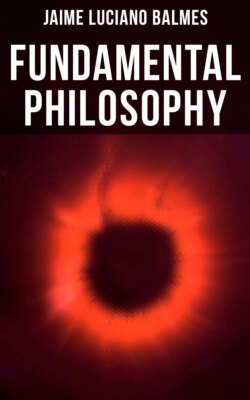Читать книгу Fundamental Philosophy - Jaime Luciano Balmes - Страница 13
CHAPTER IX. UNIVERSAL IDENTITY—CONTINUED.
Оглавление100. These systems, as absurd as they are fatal, although under distinct forms, and by various means, they tend to prepare the way for pantheism, contain a profound truth which, disfigured by vain cavils, seems to be an abyss of darkness, whereas it is in itself a ray of most brilliant light.
The human mind seeks that by reason to which it is impelled by an intellectual instinct; how to reduce plurality to unity, to re-unite, as it were, all the variety of existences in a point from which they all proceed, and in which they are all absorbed. The understanding knows that the conditioned must be included in the unconditioned, the relative in the absolute, the finite in the infinite, the various in the one. In this, all religions, all schools of philosophy agree. The proclamation of this truth belongs to no one of them exclusively; it is to be met with in all countries of the world, in primitive times, back even to the cradle of the human race. Beautiful, sublime tradition! Preserved through all generations, amid the ebb and flow of events, it offers us the idea of the Divinity presiding over the origin and destiny of the universe.
101. Yes! The unity sought by philosophers is the Divinity itself—the Divinity whose glory the firmament declares, and whose august face of ineffable splendor appears to us in our inmost consciousness. Yes! it is the Divinity which enlightens and guides the true philosopher, but blinds and confounds the proud sophist; it is what the true philosopher calls God, and venerates and adores in the sanctuary of his soul, but what the insensate philosopher, with sacrilegious profanation, calls the me. Considering its personality, its consciousness, its infinite intelligence, and its most perfect liberty, it is the foundation and the copestone of religion: distinct from the world, it produced the world from nothing, and preserves and governs it, and leads it by mysterious paths to the destiny assigned in its immutable decrees.
102. There is then unity in the world; there is unity in philosophy. In this all agree; the difference is that some separate, with the greatest care, the finite from the infinite, the thing created from the creative power, unity from multiplicity, and maintain the necessary communication between the free will of the omnipotent agent and finite existences, between the wisdom of the sovereign intelligence and the fixed course of the universe: while others, affected with melancholy blindness, confound the effect with the cause, the finite with the infinite, the various with the one, and reproduce in the domain of philosophy the chaos of primeval times; but all scattering and in frightful confusion, without any hope of order or union: the earth of these philosophers is void, and darkness is upon the face of their deep; the spirit of God has not moved over the waters to fecundate the chaos, and produce oceans of life and light out of darkness and death.
The absurd systems invented by philosophical vanity explain nothing; the system of religion, which is that also of sound philosophy, and of all mankind, explains everything: the intellectual, as well as the corporeal world, is a chaos to the human mind the instant it abandons the idea of God: restore this and order reappears.
103. The two capital problems: whence the intellectual representation, and whence its conformity to objects, have with us a most simple explanation. Our understanding, although limited, participates in the infinite light; this light is not that which exists in God himself, but a semblance communicated to a being created according to his image.
Illumined by this light, objects shine upon the eyes of our mind, whether because they are in communication with it by means unknown to us, or because the representation is given to us directly by God, in the presence of objects.
The conformity of the representation to the thing represented, results from the divine veracity. An infinitely perfect God cannot take pleasure in deceiving his creatures. Such is the theory of Descartes and Malebranche, eminent thinkers, who took no step in the intellectual order, without looking to the Author of all light, and who never wrote a page on which the name of God was not traced.
104. As will hereafter be seen, Malebranche admitted that man sees every thing in God, even in this life; but his system, far from identifying the human me with the infinite being, carefully distinguishes them, not finding other means to sustain and enlighten the former than by approximating and uniting it to the second. To read the great metaphysician's immortal work is enough to convince one that his system was not that of this pure, primitive intuition, which is an act required of all empiricism, and which seems to rise within the limits of philosophy, from that intuition of the simple fact, the origin of all ideas and all facts, in which one of the dogmas of our religion, the beatific vision, seems realized upon earth in the domain of philosophy. These are senseless pretensions, and as far from the mind as from the system of Malebranche.(9)
